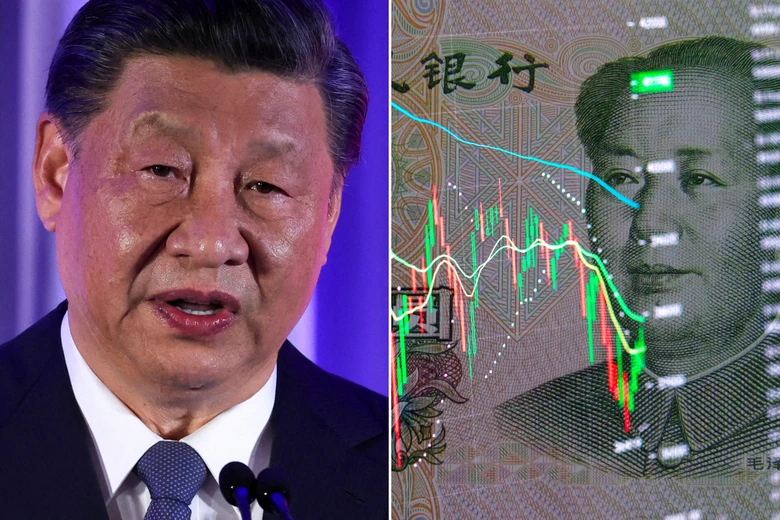China’s desperate attempt to save a waning economy
China’s economy is the second-largest in the world, behind only the United States. Measures taken by the Communist Party of China (CCP) has helped put Chinese economy on the front page. However, after years of dominating the global supply chain, China is presently facing an economic slowdown.
Major issues for an economic slowdown
China opened up to the world after a long shutdown during the pandemic. The hopes of reviving the economy which was badly affected during the pandemic seems to have gone for a toss. After performing well for several years, Chinese economy has suddenly fallen short of expectations. Some major issues at hand are – slowed consumption and production, high inflation rates and unemployment, demography, ailing property sector etc. Amongst these, demographic challenges and high unemployment rate and an ailing property sector are of utmost concern for the CCP.
Property Sector of China
It is estimated that the real estate account for between 25% and 31% of the overall Chinese economy. However, in the recent years the real estate sector has experienced a marked slowdown and grappled with a range of challenges.
Tumbling house prices have caused several major property developers, such as Country Garden and Evergrande Group, to run into financial trouble recently, and has left many others helpless with a high debt.
Facing an economic slowdown, housing purchases have dropped, and many people are unable to pay their mortgages. This has led to a serious cash flow shortage for real estate developers. These developers are heavily dependent on bank loans and bonds to finance their land acquisitions and construction projects. Due to the present situation of real estate in China, developers are now struggling to repay bank loans and other debts.
In order to save this sector from collapsing, the government has made many relaxations and eased restrictions on property purchase.
Guangzhou City has become the first first-tier city to lift purchase restrictions on houses with an area of over 120 square metres. Officials have included ‘sell one, buy one’ and ‘rent one, buy one’ policies. Shanghai has also lowered the eligibility criteria for buying property, even non-hukou residents. As per the new regulations issued on 30 January, 2024 any individual who has been paying social security tax for five years in Shanghai is eligible for buying a property. The new relaxations in the property sector indicate CCP’s desperate attempt to boost up its property sector.
Unemployment and demography
The next major challenge at CCP’s hand is high unemployment rates and an aging population – both of which is going to have a major impact on the Chinese economy. The bustling and demanding lifestyle of China has prompted several couples to not have children. Many young couples have cited the rising cost of parenthood and childcare as the major reason for not having children.This has contributed to the current population decline.
The government has implemented several policies like – relaxing ‘one-child policy’, cash handouts for babies, tax cuts etc for tackling the present demographic challenges. President Xi has also made the country’s demographic challenges a priority, pledging ‘a national policy system to boost birth rates.’
As for unemployment, the Chinese government is making policies to tackle the issue. The government of Guangdong is offering subsidy to promote employment. Additionally, the Central Authorities took a decision to halt the publication of jobless data for the youth from August 2023 onwards in order to conceal the actual scenario of unemployment in China.
Despite the attempts made by the CCP, unemployment remains widespread and the real unemployment rate among the youth is expected to be atleast two to three times higher than what is being reported. Layoffs have increased massively in the post pandemic era. There are also reports that suggest that many government employees are being paid less that their declared salary and, in some cases, only about 50% of their salary.
Local government debt
By 2022, the official explicit local government debt reached RMB 35.06 trillion (US$4.8 trillion). Local government debt reached RMB 92 trillion ($12.58 trillion), or 76% of the country’s economic output in 2022, up from 62.2% in 2019.
According to International Monetary Fund research, China’s local governments are responsible for 85 per cent of general budgetary spending, bearing significant fiscal duties in areas such as pensions, medical care and unemployment insurance. The existing stockpile of local debts compromises local governments’ capacity to deliver these public goods creating dissatisfaction within the public. The inability of the local government to provide for its residents will naturally put added economic pressure on the residents of China.
Xi’s dilemma
Given the present state of the Chinese economy, Xi Jinping is facing the dilemma of loyalty vs competence. He needs capable and competent cadres assist him in navigating this complex economic landscape. However, in doing so he might have to empower other members of the Party, other than those known only for their loyalty. However such cadres will inevitably steal Xi’s limelight. Xi’s preferred course of action is yet to be seen, but one thing is for sure, the Chinese government needs to make some major policy changes in order to deal with the current economic slump.













